| Back to Back Issues Page |
 |
|
Vegetable Gardening Hints, Spring 2018 May 17, 2018 |
Hello, Using transplantsThe challenge of growing seeds outdoors is excessive rainfall. Too much moisture can saturate the soil preventing the seeds from germinating or they could rot. If the temperature is too warm the soil can become dry and hard which prevents the sprouting seed from breaking through the soil. By starting seeds indoors you have more control over the weather and outdoor elements. You have control over how much water the seeds get, however they need constant attention often they need to be watered at least twice a day if the weather is warm. 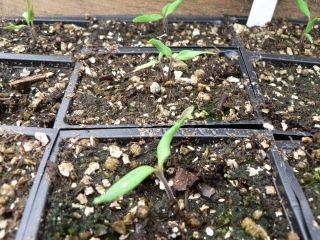
Seeds do not need light to germinate however once they have broken through the surface they need as much light as possible. A sign your seedlings are not getting enough light is they become leggy and spindly looking. Another concern is extreme temperatures. Young seedlings can burn and wilt very easily in the heat, and can easily die if they get too cold. Protecting them from extreme temperatures is necessary. If you started some of your own transplants they will be ready to go into the garden after four to twelve weeks depending on what vegetable seeds varieties you started. You want the seedlings to have at least four true leaves before setting them out and make sure the soil temperature is warm enough for those heat-loving veggies.
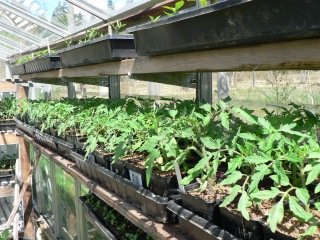
If you have decided to purchase your transplants make sure you place them into the ground within a day or so of bringing them home from the nursery. It is important to transition some seedlings like tomatoes or peppers from being inside to being outside. They need to be set outside during the day and brought back in at night; you will gradually extend the time they are outside over several days. This is called hardening off. You will need to take extra care of your seeds and seedlings the first few weeks after planting them; once they get established they will need less of your attention. Young seedlings are tender and tasty making them more susceptible to some pests. One common concern for outdoor seedlings is slugs. If the leaves of your young lettuce or spinach plants are being eaten you may have slugs. Part of caring for you seedlings is taking the time to observe them and if you find something wrong investigate to find out what is happening to your plants. 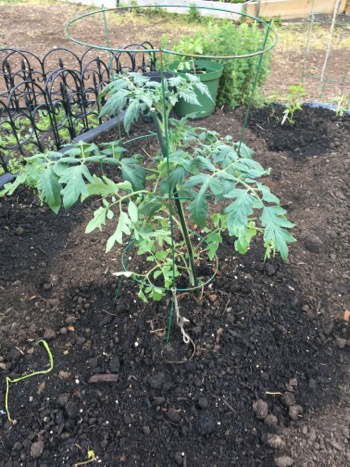
Here is a checklist for setting out your transplants:- Make sure the cells are moist before they get planted.- Gently massage the seedling out of the cell trying not to disturb the roots too much. Try not to tear the cell so you can reuse it next season. - Make a hole the depth of the cell and place the transplant into it. Cover it with soil and firmly press the soil around the base of the plant. - Water the transplant after planting. Remember the roots are tiny and close to the surface so water regularly so the soil does not dry out. - Protect the plant from too much heat or cold so it can get a good start.
Choosing the right seed and making sure the seedling gets the best start it can will go a long way to having a successful vegetable garden. A little care and attention in the beginning of a plants life will give you a much healthier vegetable plant which in turn will give you a more abundant harvest. New ebook with specific dates for planting2018 Vegetable Garden Journal I have written a new ebook giving you the best days each month to plant using the moon cycles. The dates are separated into two different groupings.- Best dates for the above ground vegetables like lettuce, tomatoes, cucumber, peas, beans that produce seeds or fruit above ground. - Best dates for the below ground vegetables such as carrots, potatoes that produce the tuber below ground. My community garden update:I had covered my garden plot last fall with leaves, this spring most of them had decomposed leaving a nice dark rich looking soil for me to use. I fertilized and then hoed and rakes it in about 6 inches down. I seeded lettuce, salad greens and peas so far.
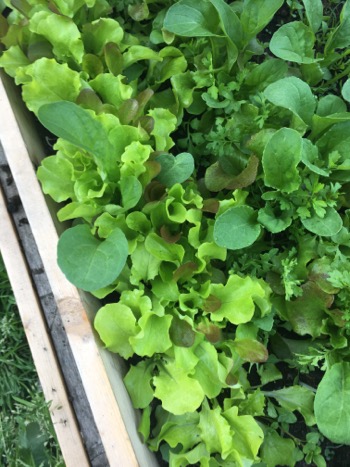
My first harvest for the season was a bunch of chives that were planted last year. 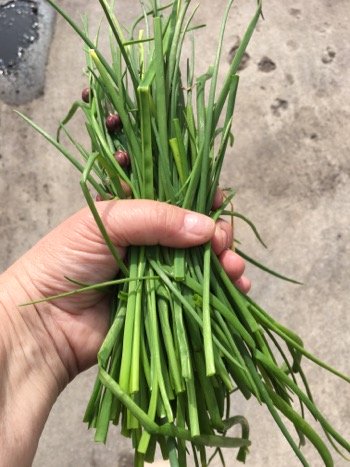
Online coaching available.Do you have questions about certain aspects of your garden, or need some direction on how to get your garden started? Let's have a face to face conversation via Skype? I offer online coaching sessions.Catherine recommends her book:Why is Soil so Important is a great new book giving simple and easy instructions on making and keeping your garden soil healthy. Other vegetable gardening books written by Catherine Abbott, Your Vegetable Gardening Helper.
Join my facebook groupwww.facebook.com/groups/veggiegardenhelper Get everyone growing a few of their own veggies. Forward this FREE ezine to a friend.
Happy gardening! Catherine |
| Back to Back Issues Page |